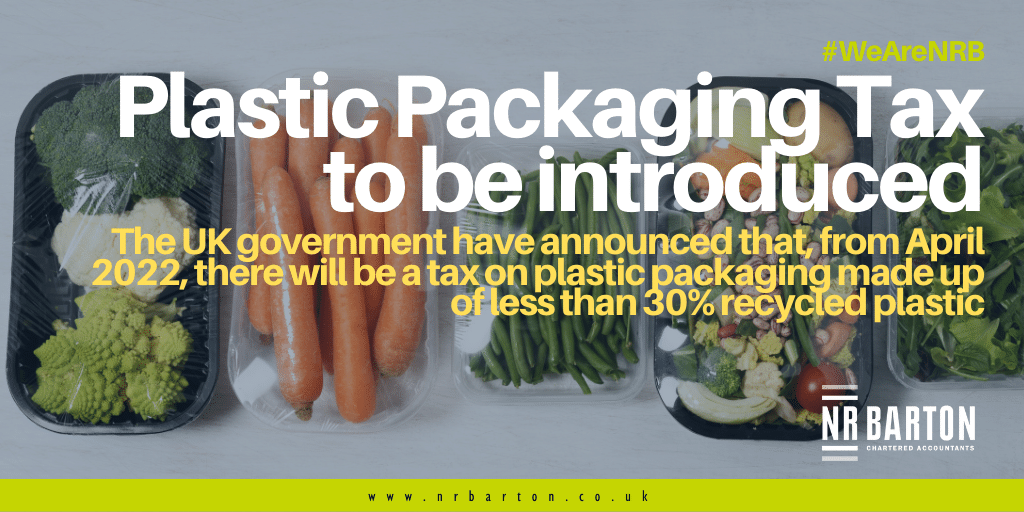In aim to reduce plastic waste across the UK, the UK government have released the details of a new Plastic Packaging Tax which will take effect from 1 April 2022. This will encourage the use of recycled rather than new plastic within plastic packaging. This is expected to stimulate increased levels of recycling and collection of plastic waste, diverting it away from landfill or incineration. Within this blog we outline the details of the new Tax and the implications for your business(s).
If you are a business that manufactures or imports plastic packaging, including if you import packaging which already contains goods (such as plastic bottles), there are things you should do now in preparation for the tax. However, in cases where the packaging you import already contains goods, such as plastic bottles filled with drinks, the tax only applies to the packaging itself.
For those businesses which supply recycled plastic, it is very likely that your customers will want more information from you about the types and quantities of material you supply them.
How will the tax work?
As mentioned previously, the scheme looks to increase the recycling of plastic packaging. Due to this, the tax will apply to plastic packaging manufactured in, or imported into, the UK where the plastic used in its manufacture is less than 30% recycled.
If you are business that manufactures or imports 10 or more tonnes of plastic packaging over a 12-month period, you will need to register for the tax and the rate will be £200 per metric tonne of plastic packaging. You will need to keep records and, in most cases, register for the tax, even if all the packaging you manufacture or import contains more than 30% recycled plastic.
For example, if your business manufactures or imports 10 tonnes of plastic packaging over a 12-month period and only 1 tonne contains less than 30% recycled plastic, you will need to pay £200.
How will I pay the tax?
The online portal to register and pay will be available on 1 April 2022 when the tax takes effect.
What records do I need to keep?
First of all, if you are a business that manufactures or imports plastic packaging, you will need to ensure that you have the correct information regarding the plastic that you are using. This will be essential to establish how much plastic packaging tax, if any, you need to pay. The information you need to collect includes the percentage of recycled plastic that is in your plastic packaging, the amount of plastic, etc.
If you manufacture or import less than 10 tonnes of plastic packaging a year, you will still need to keep some records to demonstrate that you are below the tax threshold, and check if you become liable in the future.
If you do not account for the tax on plastic packaging that you supply to other businesses, including via fulfilment houses, these businesses may be found to secondarily or jointly liable for any unpaid tax with you. This means that if you buy plastic packaging on which the tax should have already been paid, you may need to check that this is being properly accounted for to avoid being held accountable for any unpaid tax yourself. More information on keeping records of plastic packaging can be found here.
How will this affect invoices?
If accounting for the tax is your responsibility, you will need to ensure that any invoice you issue to a business customer shows a statement that Plastic Packaging Tax has been paid on the packaging concerned. This may require changes to your invoicing software, so it is advised that you start to prepare for this new requirement now.
What if my business is based outside of the UK?
Non-resident taxpayers who import more than 10 tonnes of plastic packaging in a year into the UK will need to register for the tax and account for any tax due. You will need to register even if the plastic packaging you use contains more than 30% recycled plastic.
If you import less than 10 tonnes of plastic into the UK, you will still need to keep some records to show this.
What if I am exporting plastic packaging, not importing?
If your goods are intended for export, you can defer paying the tax for up to 12 months from the point of manufacture or import. You will not have to pay the tax if the goods are exported within that 12-month period and you may be able to credit the tax you have become liable for, where packaging is concerned.
In conclusion, the new Plastic Packaging Tax will attempt to increase the rate of recycling and reduce the amount of plastic waste ending in landfill and/or the oceans. Until the primary and secondary legislation regarding this tax become law, the details of the scheme are subject to change but, as it stands, this tax will only concern businesses manufacturing or importing large quantities of plastic packaging. Hopefully this tax rate of £200 per tonne will be enough to persuade businesses to make the shift to more sustainable packaging.
If you have any questions about the content in this article, please contact your usual Partner or Manager, or call us on 01942 242 245, and we will be happy to help.


